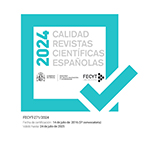De herejías, blasfemias, proposiciones y "malas palabras". Una caracterización de los pecados de palabra en el pensamiento teologal (siglos XVI a XVIII)
Résumé
En el trabajo se presenta una caracterización de los pecados de palabra, es decir, aquellas transgresiones en las que predominaba la oralidad, a fin de entender cuál era el lugar que se les asignaba dentro de un orden normativo que tendía al control de las actividades de los individuos y la razón por las que se les perseguía. Se muestra, en un primer momento, cuáles fueron las modificaciones del pensamiento cristiano que permitieron realizar clasificaciones específicas de los pecados, pues a raíz de la emergencia del tomismo, y el predominio de una ética sustentada en el Decálogo, se comenzó a hablar de pecados de palabra, pensamiento, obra y omisión. En la investigación también se presentan los mecanismos que la Iglesia Católica utilizó para controlar el uso de la palabra. Se buscaba tener un estricto control de la palabra para evitar que se propagaran ideas erróneas, ideas que podían quebrantar el edificio doctrinal y el sistema de creencias. La libertad de pensamiento, la duda o la incredulidad no eran permisibles en un esquema que buscaba imponer su visión del mundo, y que, por lo mismo, no podía permitir la disensión o el cuestionamiento de sus paradigmas.Téléchargements
##submission.format##
Licence
La revista 'Ilu. Revista de Ciencias de las Religiones, para fomentar el intercambio global del conocimiento, facilita el acceso sin restricciones a sus contenidos desde el momento de su publicación en la presente edición electrónica, y por eso es una revista de acceso abierto. Los originales publicados en esta revista son propiedad de la Universidad Complutense de Madrid y es obligatorio citar su procedencia en cualquier reproducción total o parcial. Todos los contenidos se distribuyen bajo una licencia de uso y distribución Creative Commons Reconocimiento 4.0 (CC BY 4.0). Esta circunstancia ha de hacerse constar expresamente de esta forma cuando sea necesario. Puede consultar la versión informativa y el texto legal de la licencia.











